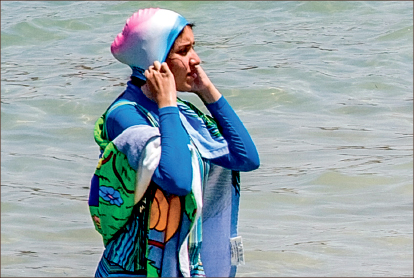France’s burkini backlash

A ban on the Muslim swimwear continues to create division
It is ironic that some cities in France, a country known for its revolutionary rallying cry of liberty, equality and brotherhood, should ban something that brings a bit of freedom to Muslim women.
In the wake of a deadly terrorist attack in the French city of Nice, around 30 cities along the French Riviera decided to ban the burkini, a full-body swimming suit worn by Muslim women.

DISCRIMINATION — The ban contributed to rising cultural tension in France following terrror attacks. Photo credit: Google images
According to a Pew Research Center estimate, France has the second largest Muslim population of any European Union member nation, around 4.7 million, which is 7.5 percent of France’s population.
In the past two years, the nation has seen terrorist attacks from one that killed around 130 people in Paris in November 2015 to the killing of a Catholic priest in Normandy in July 2016.
Because of the frequency of terrorist attacks in their nation and other Western European countries, French are worried about the threat Islamic extremists pose to their nation.
To some French, an outer sign of jihadists is the burkini.
In an article from the Gatestone Institution, the mayor of Cannes, David Lisnard, called the burkini a “uniform that is the symbol of Islamic extremism.”
The same article quotes Cannes’s city manager, Thierry Migoule, who called the burkini an “ostentatious outfit that signals allegiance to terrorist movements that have declared war on us.”
In other words, by banning the burkini you’ll put a stop to extremism among French Muslims.
But this is where French lawmakers in southern France are wrong.
While they believe that banning the burkini will kill religious fervor among France’s Muslims, it could likely end up doing the opposite and cause France more harm than good.
Seeing that people in their Western home are trying to suppress their freedom of religion, many French Muslims will likely grow angry and turn to extremism as a way to preserve their religion from what they view as Western contamination.
Many young Muslims are exposed to radical Islam in their neighborhoods where they live with other Muslims.
After this exposure and seeing firsthand how the West is attempting to end religious sentiment among them, many Muslims may decide to turn to jihad.
Saying that all Muslims frustrated with the West will turn to radicalized Islam is an incorrect assumption about Muslims, however.
Some Muslims desiring to fight back against attempts to westernize them will do so using more peaceful methods; some will be vocal by participating in local government.
They may also speak out to convince the 64 percent of French that the Gatestone Institution article says are opposed to the burkini to allow Muslim women to wear it.
The majority of the French population opposed to burkini usage is also forgetting that while worn by Muslim women, the burkini is not a symbol of extremism.
Banning burkinis or the burka and niqab, coverings that Muslim women wear on the street that were also banned in France at one point, will not solve the problem of religious extremism.
For Muslim women, the burkini allows them to comply with their religion’s rules on modesty while also allowing them to swim and enjoy the water with their families instead of standing on the beach and watching their family swim.
Thus, for Muslim women, the burkini is freeing, and French cities banning the burkini are restricting that small piece of freedom, making those Western cities as restrictive as the Muslim nations many of the women originally came from.
DEPIERO is an opinion writer.
